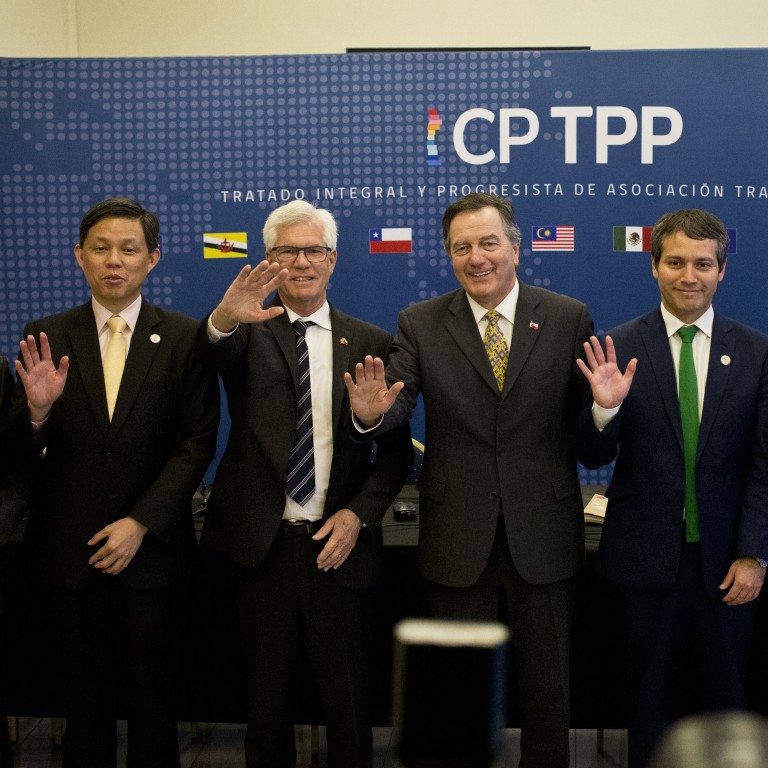
Mainland China hits out at Taiwan’s bid to join trans-Pacific trade bloc
- Beijing says it opposes the island joining international bodies as Taipei seeks to join Comprehensive and Progressive Agreement for Trans-Pacific Partnership
- ‘China has long tried all it could to squeeze Taiwan’s international space,” says island’s top trade negotiator John Deng
Beijing has criticised Taiwan’s attempt to join a trans-Pacific trade pact saying it opposed the island joining any official international agreements and organisations.
Chinese foreign ministry spokesman Zhao Lijian said Taiwan is an inalienable part of China, when asked about Taiwan’s application to join the 11-member Comprehensive and Progressive Agreement for Trans-Pacific Partnership, which Beijing has also applied to join.
“We resolutely oppose any country’s official exchanges with Taiwan, and resolutely oppose the Taiwan region’s accession to any official agreements and organizations,” Zhao said on Thursday.
The comments highlight Taiwan’s worries that Beijing could block its membership if its application is accepted first.
The submission of the application to New Zealand, the depository nation of the agreement, came after Beijing made the same request on September 16, prompting concerns in Taiwan that the island might be barred from joining if the mainland was accepted before Taipei.
Taiwan’s top trade negotiator John Deng did not rule out the possibility.
“China has long tried all it could to squeeze Taiwan’s international space and this is a known fact. So if it joined CPTPP ahead of [us], it would pose certain risk to [our accession] to the trade bloc,” he said in Taipei on Thursday announcing the island’s CPTPP bid.
But he stressed Taiwan should have a better chance of joining the group, given that Taiwan was a free market with transparent policies and the rule of law.
He said the CPTPP had much stricter requirements than the WTO when it came to legal and market systems. “Our systems are more transparent and we respect ownership of private assets,” Deng said.
Deng said Taiwan was applying to join the bloc under the name of the Separate Customs Territory of Taiwan, Penghu, Kinmen and Matsu because the island had been using this title to seek to join global trade blocs.
“Though Taiwan has independent sovereignty … in the trade area, we have used this title at the WTO and have also used this title to sign bilateral trade agreements with New Zealand and Singapore,” Deng said.
China ‘made example of’ Lithuania to prevent domino effect, observers say
Also on Thursday, Taiwanese foreign ministry spokeswoman Joanne Ou said that questions remained about whether Beijing could meet the strict CPTPP requirements for a free and open economic system.
“CPTPP member states have many times said they would neither lower nor relax the criteria for membership because of the accession of a new member,” she said.
New Zealand confirmed that it had received a formal request from “Chinese Taipei” – the short form the WTO uses to refer to the Separate Customs Territory of Taiwan, Penghu, Kinmen and Matsu.
“New Zealand as depository for the CPTPP will share Chinese Taipei’s accession request with other CPTPP signatories,” the Ministry of Foreign Affairs and Trade said.
On Thursday, Japan, the CPTPP’s chair this year, welcomed Taiwan’s application to join the trade deal, Kyodo news agency reported.
Japanese Foreign Minister Toshimitsu Motegi described Taiwan as an “extremely important partner of Japan” that shared basic values such as the rule of law.
He said Tokyo would respond to the island’s bid “based on a strategic point of view and with the public’s understanding”.
Vietnam said on Thursday it is willing to share its experience and information on joining the pact with Beijing.
“The CPTPP is an open free-trade agreement,” foreign ministry spokeswoman Le Thi Thu Hang told a regular press briefing.
“Vietnam will consult with other CPTPP members on the recent requests to join this agreement,” Han added.
Australia’s trade minister Dan Tehan said Canberra would consider Taiwan’s application “on a consensus basis” with other member countries. He said Taiwan’s application would require Australia to have senior-level engagement with Taipei to ensure consistency with the “one-China” policy.
Taiwan should join Australia in trans-Pacific trade bloc, Canberra told
The regrouping of the pact now links Australia, Brunei, Canada, Chile, Japan, Malaysia, Mexico, New Zealand, Peru, Singapore and Vietnam. Britain is also keen to join the trade group and began negotiations in June. But the United States is yet to make a clear indication if it will join the group.
Additional reporting by Linda Lew, Reuters and Kyodo

